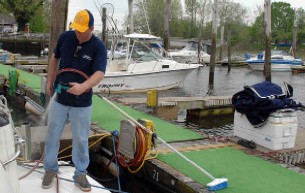" I feel like it can maybe save my life," said Donner, 56, of Atlantic City. "I thought I knew it all, but I was wrong. Now if certain situations come up, I'll probably know what to do."
Just as the prime boating season is getting under way at the Shore, the deadline looms for boaters older than 16 to obtain certification to operate a registered motorized vessel longer than 12 feet and personal watercraft such as Jet Skis. The standard Coast Guard-sanctioned course costs up to $50 and can be taken with groups such as the Coast Guard Auxiliary, the U.S. Power Squadron, and private boating schools. Some private schools offer the course online.
The licensing requirement, as per legislation passed in 2006, has been phased in over three years based on age, starting with the youngest boaters. Before this year, anyone born before 1948 had been temporarily grandfathered in from having to get the license immediately. The law applies to all boaters operating in New Jersey waters.
"I think it's an absolutely great idea to have anyone who's out on the water understand the rules," said Edward Jones, education officer for the Barnegat Bay division of the U.S. Power Squadron, a nonprofit boaters group that has been educating the public about safety on the water since 1914. "You wouldn't let someone operate a car without a license, so why should boats be different?"
Jones said his group had been inundated with requests for its eight-hour safety course, which boaters can take before attempting the 60-question state test. To pass, boaters must get at least 48 questions correct.The squadron's classes usually attract 50 to 60 people each spring, Jones said. This year the number has doubled.
The class itself isn't required to obtain the license; the legislation allows a "test-out" option for salts who think they don't need a refresher course on the rules of the water.But Edward L. McGarvey of Ocean City, a retired Coast Guard member who has been boating for more than 40 years and administering the Coast Guard Auxiliary boaters course for six years, said all his classes had been full so far this spring.
"There is the test-out option, but a lot of the older boaters still come in for the course," McGarvey said. "At first they come in shaking their heads with the attitude that there isn't anything that I'm going to teach them about boating that they don't already know. By the end they are going out the door saying, 'Thanks, Ed, I learned things I didn't know about boating safety,' " McGarvey said.
Advances in communications - such the Rescue 21 system and new digital capabilities of standard marine radios - are especially a marvel for older boaters, according to local instructors.
Rescue 21, in service for the Coast Guard along the Shore as far north as the New York Harbor and as far south as the Chesapeake Bay, uses the digital selective calling (DSC) capabilities of marine radios to speed response time to distress calls by allowing rescuers to better pinpoint boats' locations.
But McGarvey said the most important thing he teaches boaters is to use "commonsense and common courtesy" on the water.
Dan Charter, flotilla staff officer for the Coast Guard Auxiliary unit based in Camden and Burlington Counties, said his group had noticed an uptick in course interest since 2006 that has leveled off this year.
"I think a lot of people saw this deadline coming and took the courses over the last couple of years so we aren't seeing a big rush of enrollment this year to meet the June 1 deadline," Charter said. "What we have been seeing is a greater interest in boating safety overall, and I think that is a good thing as more and more people every year take to the waterways of the state."
And what is the one thing that Charter, who has been teaching boating safety for more than 20 years, hopes students will remember?
"Always wear a life jacket," he said. "Even if you know how to swim, it's the most important life-saving tool on a boat."
For Information
For dates and times of safe-boating courses, call the New Jersey State Marine Police at 1-800-336-2628 or go online to the Coast Guard Auxiliary at www.cgaux.org or the U.S. Power Squadron at www.usps.org.







